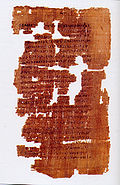
Back Handelinge van Paulus Afrikaans سفر أعمال بولس Arabic Fets de Pau Catalan Paulusakten German Agoj de Paŭlo Esperanto Hechos de Pablo Spanish Actes de Paul French Hannelingen fan Paulus Frisian Pál apostol cselekedetei Hungarian Kisah Rasul Paulus ID
This article needs additional citations for verification. (January 2016) |
| Part of a series on |
| New Testament apocrypha |
|---|
 |
|
|
| Part of a series of articles on |
| Paul in the Bible |
|---|
 |
The Acts of Paul is one of the major works and earliest pseudepigraphal series from the New Testament apocrypha also known as Apocryphal Acts. This work is part of a body of literature either about or purporting to be written by Paul the Apostle, including letters, narratives, prayers, and apocalypses. An approximate date given to the Acts of Paul is 100-160 AD.[1] The Acts of Paul were first mentioned by Tertullian, who deemed the work to be heretical. He mentioned that that the writings "wrongly go under Paul's name" and was "augmenting Paul's fame from his own store".[2] Eusebius wrote than, unlike other writings which were classified as antilegomena in some instances, the Acts of Paul were always classified among the disputed.[3] The Acts of Paul may have been considered orthodox by Hippolytus of Rome but were eventually regarded as heretical when the Manichaeans started using the texts. The author of the Acts of Paul is unknown, but probably came from a Christian community in Asia Minor that revered Paul. The work does not use the canonical Acts of the Apostles as a source; instead it relies on oral traditions of Paul's missionary work. The text is primarily known from Greek manuscripts.[4] The discovery of a Coptic language version of the text demonstrated that the text was composed of:
- The Acts of Paul and Thecla
- The Third Epistle to the Corinthians
- The Martyrdom of the Holy Apostle Paul
All of these constituent parts were often considered worth treating as separate texts and frequently appeared independently, leading to speculation that the Acts of Paul may have been compiling disparate stories into one work, although other parts scholars believe to be original to the Acts of Paul. Besides the four main sections mentioned above, the remainder of the Acts of Paul exist only in fragments from the 3rd and 5th centuries:
- The Healing of Hermocrates from Dropsy
- The Strife of the Ephesian Beasts
The texts are a coherent whole and are generally thought to have been written by one author using oral traditions, rather than basing it on any of the other apocrypha or the orthodox canon. The main emphasis of the text is on chastity and anti-Gnosticism. According to Tertullian, the author was a priest in Asia Minor. Tertullian mentions that after the priest wrote the work adding his own ideas to Paul's fame, the priest was "convicted" and "was removed from his office".[2]
- ^ Jones, Timothy Paul (2007). Misquoting Truth. InterVarsity Press. p. 167..
- ^ a b "CHURCH FATHERS: On Baptism (Tertullian)". www.newadvent.org. Retrieved 2024-02-25.
- ^ "Eusebius on the Canon of Scripture". www.bible-researcher.com. Retrieved 2024-02-25.
- ^ Pervo, R.I. (2014). The Acts of Paul: A New Translation with Introduction and Commentary. Wipf & Stock Publishers. p. 61. ISBN 978-1-63087-146-8.
© MMXXIII Rich X Search. We shall prevail. All rights reserved. Rich X Search